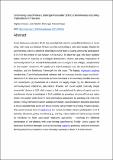Community-based Forest Landscape Restoration (FLR): Determinants and policy implications in Tanzania

View/
Date
2021-10Author
Owusu, Raphael
Kimengsi, Jude
Moyo, Francis
Metadata
Show full item recordAbstract
Forest landscape restoration (FLR) has gained global scientific and political attention in recent times, with many sub-Saharan African countries committing to restoration targets. Despite the commitments, there is a dearth of information on the factors shaping community participation in FLR in the context of sub-Saharan Africa (SSA). To close this gap, this study explored Babati District in Tanzania to investigate determinants, choices and policy implications of community-based FLR. A total of 98 households were surveyed in two villages, complemented by four experts’ interviews. We employed a hybrid analytical lens; the socio-ecological co-evolution, and the livelihoods framework for the study. The logistic regression analyses revealed that: (i) while both perceived monetary and non-monetary benefits shape households’ interest in FLR, asset-poor households are more interested in the monetary benefits than their rich counterparts, (ii) households FLR choices are largely shaped by the effectiveness of community-based institutions, (iii) natural, financial and social capital positively shaped households’ choices in FLR while a negative link was established for physical capital, and (iv) crop farmers choose to participate in FLR activities by growing a mixture of fruit and native timber tree species while those in other professions participated by planting only fruit trees species. Policy interventions which valorise community-based institutions should be prioritized to ensure equitable land access and tenure security, and promote the growing of native species. This would increase trust on land tenure and would invariably enhance participation in FLR activities. Moreover, policy incentives (e.g., training, micro-credit and market access) should be introduced to foster agro-based restoration approaches – involving the deliberate combination of tree-planting with crop-farming (agroforestry). Finally, policy support for alternative livelihood strategies such as bee keeping, butterfly gardening, snail and mushroom farming should be promoted to reduce monetary expectations from FLR interventions.
URI
https://doi.org/10.1016/j.landusepol.2021.105664https://dspace.nm-aist.ac.tz/handle/20.500.12479/2234
